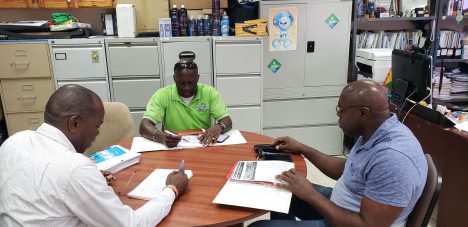You are currently browsing the monthly archive for April 2019.

L-R: Leslie Smith, Nicholas Joseph, John Campbell
St. George’s, Grenada, April 02, 2019: The two refrigeration and air conditioning (RAC) technicians, Mr. Nicholas Joseph and Mr. John Campbell, who recently participated (March 25-29) in a study tour on natural refrigerants in Costa Rica, paid a visit to the National Ozone Unit (NOU) on their return. They met with the National Ozone Officer (NOO), Mr Leslie Smith to report on their experiences as well as to provide recommendations for consideration for the local RAC sector.
Mr. Campbell, who is the Public Relations Officer of the Grenada Refrigeration, Air Conditioning and Ventilating Association (GRAVA) and a senior technician at the St. George’s University (SGU), views the experience as “eye opening” and was particularly impressed with the design, layout and workmanship of the facilities visited. He was also impressed with the details and emphasis that were placed on safety and maintenance, since the refrigerants used at the sites have either high levels of flammability or toxicity. He reiterated, that the support from Government in establishing the necessary legislation and enabling environment is critical for the application of these technologies in Grenada. He sees hydrocarbons as a feasible option for Grenada in the unitary air-conditioning sub-sector.
Mr Joseph, who is also an executive member of GRAVA (Asst. Secretary) and a businessman in RAC equipment, viewed the experience as very educational and one that has broadened his knowledge on natural refrigerant technology. He encourages young and senior technicians to make an effort to participate in opportunities like these, whenever possible. When asked about the business potential for R-290 systems in Grenada, he response was ,” I see a great opportunity for R-290 (hydrocarbon) systems in Grenada, not only because of their environmental benefits, but mainly because of their energy efficiency and savings, in terms of dollars and sense”.
Both participants expressed their gratitude to the NOU in facilitating their participation in the study tour and indicated their willingness to share their experiences with other technicians and to support the initiatives of the NOU in promoting natural refrigerant technology. The tour to Costa Rica was facilitated under the Sustainable Phase-out of Ozone Depleting Substance (SPODS) project. the SPODS project is co-financed by the European Commission and the Government of Germany, through the GIZ as the implementing agency.
Natural refrigerant technology (hydrocarbons, ammonia and carbon dioxide) is one of the RAC technologies that is promoted by the NOU, as a replacement for the ozone depleting and/or high global warming potential refrigerants currently used in Grenada. Natural refrigerants have zero ozone depleting potential (ODP) and a global warming potential (GWP) of less than 3, while at the same time delivering better energy efficiencies than other refrigerants.








